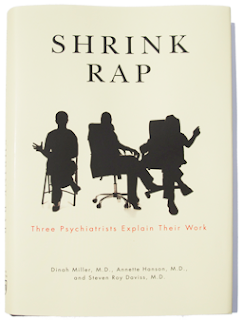July 3rd, 2011 by Dinah Miller, M.D. in Opinion
No Comments »




 When Jesse read our Shrink Rap book, he said we were too nice to psychiatrists in it– that we didn’t mention that there are some really bad psychiatrists out there and he thinks part of the venom towards psychiatry comes from the whole rushed 15 minute med-check culture.
When Jesse read our Shrink Rap book, he said we were too nice to psychiatrists in it– that we didn’t mention that there are some really bad psychiatrists out there and he thinks part of the venom towards psychiatry comes from the whole rushed 15 minute med-check culture.
I thought about this and I thought, really? We have a whole chapter called When Things Go Wrong and we discuss a psychiatrist who is not sensitive enough to a patient (though, granted, the patient is overly demanding and overly sensitive–so I guess not the best portrayal of insensitivity by a shrink), one who is rigid in her formulation to the point of almost destroying a family, one who prescribes medication that makes a patient fat and diabetic, and finally, a psychiatrist who is outright unethical and criminal: who defies all boundaries and gives her patient prescriptions for narcotics to bring back to her! Like how much worse could I make the shrinks? As one Amazon reviewer said,
The authors are careful to include what might be called opposing views. They give some space to the anti-psychiatry movement, and they consider the recent cases of medications that seem to cause suicidal thinking in some patients. But they balance that against the suicidal thinking that is prevented in some other patients by the same medications. They also talk about the influence of drug companies in a fairly open way.
There are no heroes here. The authors aren’t in the business of justifying themselves, and one or two of the fictional therapists we see in the book do spectacularly bad jobs and harm patients.
But Jesse is right, overall the examples portray psychiatrists who are thoughtful and caring, Read more »
*This blog post was originally published at Shrink Rap*
June 29th, 2011 by Dinah Miller, M.D. in Health Tips
No Comments »




 For those who don’t follow the comment sections of posts, there have been commenters who have been telling us about the awful experiences they have had as psychiatric patients. In particular (but not exclusively) as hospital inpatients. Commenters have used terms like “abuse” and “humiliation” and describe awful scenarios. One person asked why the mean nurses don’t get fired, everyone knows they are mean including the staff. Others throw the baby out with the bath water, one bad experience. There is implication by at least one commenter that he/she would rather die (presumably permanently) rather than face a day on a psych unit again. The suffering in these posts is palpable.
For those who don’t follow the comment sections of posts, there have been commenters who have been telling us about the awful experiences they have had as psychiatric patients. In particular (but not exclusively) as hospital inpatients. Commenters have used terms like “abuse” and “humiliation” and describe awful scenarios. One person asked why the mean nurses don’t get fired, everyone knows they are mean including the staff. Others throw the baby out with the bath water, one bad experience. There is implication by at least one commenter that he/she would rather die (presumably permanently) rather than face a day on a psych unit again. The suffering in these posts is palpable.
To those who feel better after leaving comments on Shrink Rap, by all means, feel free to continue, but this will not change the world. May I put in a request? If you’ve had an awful experience as a patient on a psychiatric unit, please tell the hospital. One commenter said she (/he?) complained to the hospital administration and heard that some changes were made. My thoughts? You Go Girl! (If the commenter was a male, I’m at a loss. Way to Go, Joe! perhaps?) Complain, it can’t hurt.
Oh, you say, no one listens to psychiatric patients, they just say we’re crazy so they don’t have to listen. For an isolated complaint, you may be right, Read more »
*This blog post was originally published at Shrink Rap*
June 2nd, 2011 by Dinah Miller, M.D. in Opinion
No Comments »




 Here at Shrink Rap, we often talk about the stigma of having a psychiatric disorder. It’s funny, but society has it almost ranked, so that certain illnesses are very stigmatized–schizophrenia and schizoaffective disorder, and borderline personality disorder, to name a few, and others are pretty much socially acceptable: Attention Deficit Disorder, for example, especially among the high school/college crowd where the patient often gets identified (or self-identifies) as the source for those late-night stimulants that so many kids cop.
Here at Shrink Rap, we often talk about the stigma of having a psychiatric disorder. It’s funny, but society has it almost ranked, so that certain illnesses are very stigmatized–schizophrenia and schizoaffective disorder, and borderline personality disorder, to name a few, and others are pretty much socially acceptable: Attention Deficit Disorder, for example, especially among the high school/college crowd where the patient often gets identified (or self-identifies) as the source for those late-night stimulants that so many kids cop.
It’s not just the patients. Psychiatrists are also stigmatized, and that doesn’t help much when our society talks about the shrink shortage.
Exalya writes:
I’m a first (almost second) year medical student with a strong passion for psychiatry. I love listening to your podcasts; you give me hope for my future when the drudgery of first year classes is getting me down, and I feel like I always learn something useful.
That aside, I am writing to you seeking some advice. Read more »
*This blog post was originally published at Shrink Rap*
May 22nd, 2011 by Dinah Miller, M.D. in Announcements
No Comments »


Aloha from the American Psychiatric Association’s Annual Meeting in Honolulu! The weather is gorgeous here and it’s been a great meeting. Yesterday, I heard Archbishop Desmond Tutu speak, and today, I listened to “Conversations” with Lorraine Bracco–also known as Dr. Melfi from The Sopranos. The beach is nice, too, and Clink has been scuba diving. Should I tell you she just learned to swim this past winter? She is amazing!
In a few hours, we will be giving our workshop, The Accessible Psychiatry Project: The Public Face of Psychiatry in New Media. We are telling the audience that the survey we did was not validated, was not statistically analyzed, and is not real science. Mostly, it was about how cool it is that we can even do this at all (ask questions, interact with readers, have an impact). I thought I’d share the survey results with everyone here. If you took the survey, thank you, again.
702 responses Summary See complete responses Read more »
*This blog post was originally published at Shrink Rap*
May 16th, 2011 by Dinah Miller, M.D. in Expert Interviews
No Comments »




 When Roy and I were on Talk of the Nation this past week, a called phoned in to ask about her sister. The question was about care in the Emergency Room/Department, so it was a perfect Roy question and he fielded it. I’ve been playing with it since, and wanted to talk more about this particular scenario, because the scenario was very common, and the question was more complicated than it seems.
When Roy and I were on Talk of the Nation this past week, a called phoned in to ask about her sister. The question was about care in the Emergency Room/Department, so it was a perfect Roy question and he fielded it. I’ve been playing with it since, and wanted to talk more about this particular scenario, because the scenario was very common, and the question was more complicated than it seems.
From the transcript of the show:
ANN (Caller): Hi, thank you very much. I would like to ask Dr. Roy (oh, I gave him his blog name here) a question: My sister was admitted to emergency when she cut her wrists, and the doctor on call pulled me aside and said, do you think she was trying to kill herself?
And I said – because my sister is very intelligent – I said, if my sister really wanted to kill herself, she would have done it. I think she’s asking for help.
And so he said – and so he had her see the psychiatrist who was on call, or on duty. And she spoke with him for a while. And he sent her home, saying: Well, if you need me, I’m here.
What I would like to ask Dr. Roy is, what protocol was going on there? Why did they allow that to happen? And what would you change, if you could? Read more »
*This blog post was originally published at Shrink Rap*

 When Jesse read our Shrink Rap book, he said we were too nice to psychiatrists in it– that we didn’t mention that there are some really bad psychiatrists out there and he thinks part of the venom towards psychiatry comes from the whole rushed 15 minute med-check culture.
When Jesse read our Shrink Rap book, he said we were too nice to psychiatrists in it– that we didn’t mention that there are some really bad psychiatrists out there and he thinks part of the venom towards psychiatry comes from the whole rushed 15 minute med-check culture.











